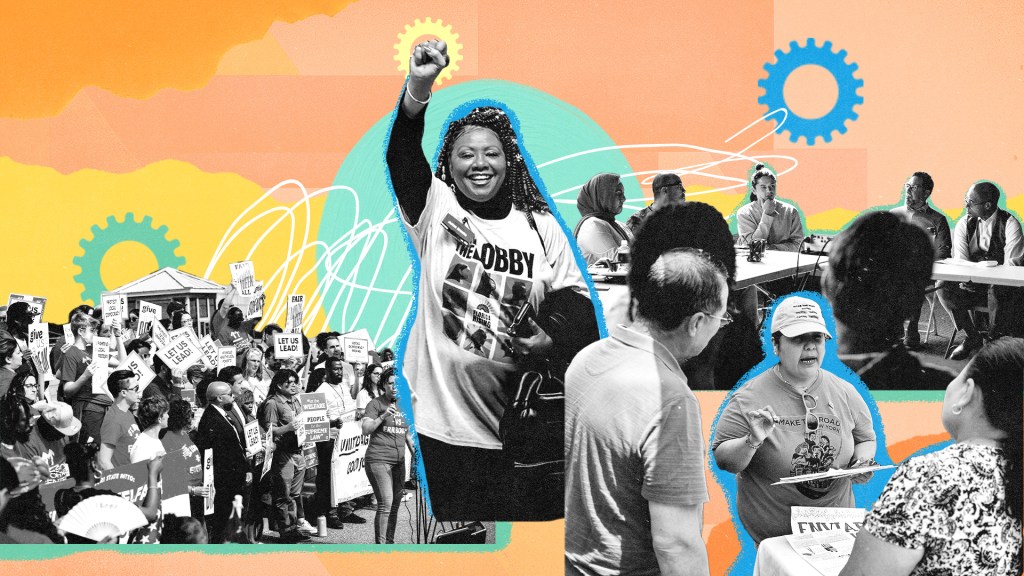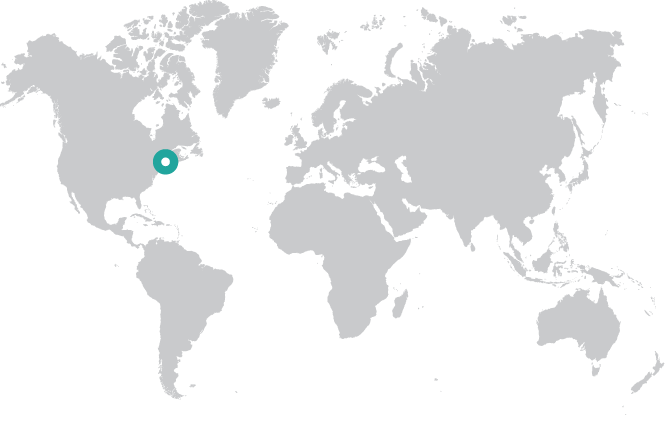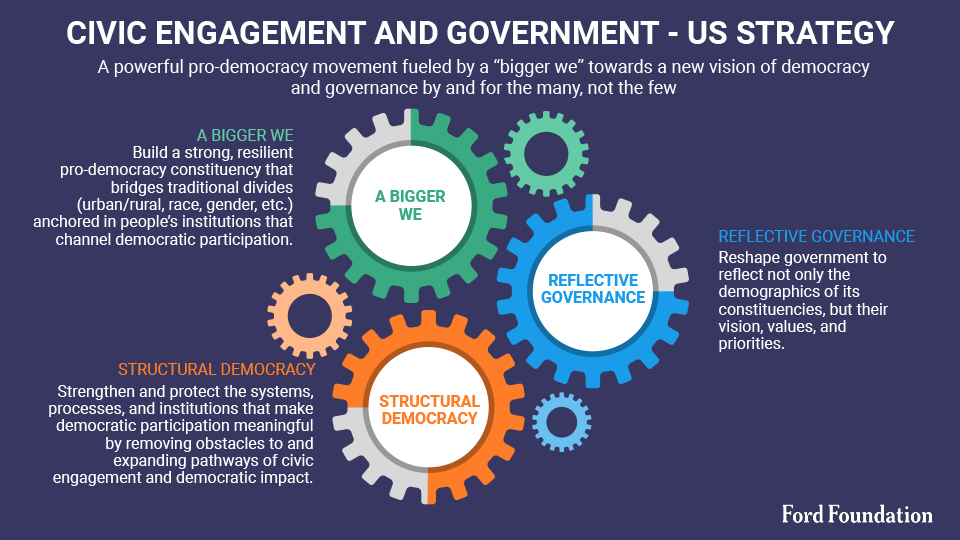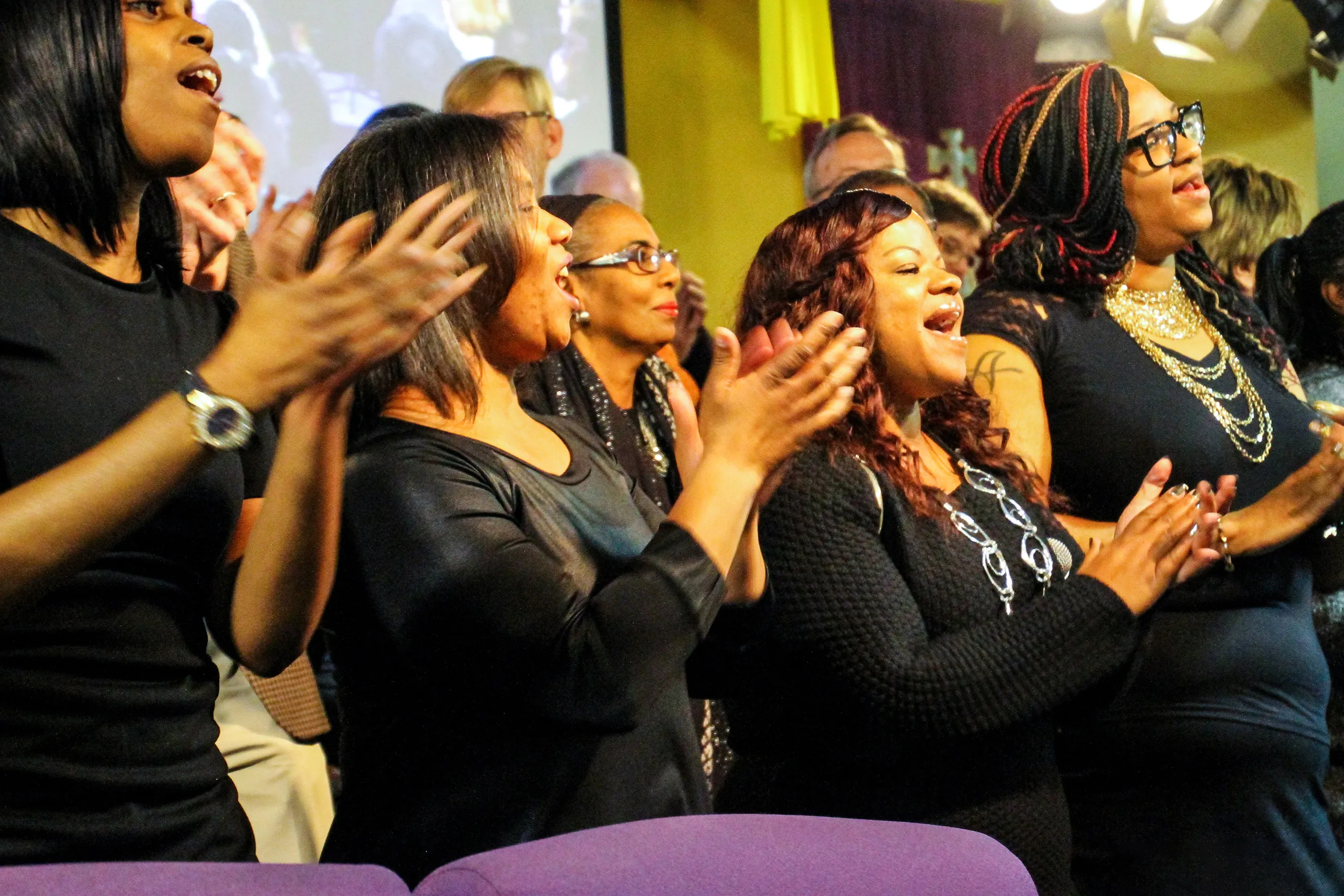U.S. Strategy

The United States faces an unprecedented crisis of democracy, one that goes to the heart of who is allowed to belong, who makes critical decisions, and what values guide our nation’s future. The current use of redistricting to protect minority power and attacks on elections and representation are symptoms of deeper problems of inequality, injustice, and exclusion that have endured since the nation’s founding. If we are to address these challenges, those who bear the brunt of inequality must be central in redefining our democracy.
The Challenge
Our democracy faces three compounding threats: government increasingly dominated by elite interests; rising nationalism rooted in racism, misogyny, and authoritarian tendencies; and rampant polarization.
Inequalities built into the structure of U.S. democracy are now being exploited in ways that further undermine the voice and power of large portions of the country. This is compounded by an electoral system that provides disproportionate influence to rural voters. As a result, in 2020, the 26 states with the smallest populations, representing only 18% of the nation, provided the majority of votes in the Senate.
This crisis is amplified by a lack of trust in government, particularly among youth, many of whom believe that the government cannot deliver on its promises and see little benefit in political engagement.
The Opportunity
To build a resilient, robust democracy for the many, not the few, government must be accountable to a broader set of constituents and reflect priorities shared across all communities, especially those that have not historically been in power. We need a bigger “we.” Civil society must overcome obstacles to democratic engagement and build ways for people to participate so that marginalized communities can impact the decisions that affect their lives.
Pathways of democratic engagement need to be strengthened and expanded at all levels of government. However, in an era of federal deadlock, it is at the state level where either effective governance is demonstrated and tangible progress is made, or backsliding and regressive policies take root and grow.
We need to reimagine governance and develop new and innovative strategies that reinforce collaboration between communities and government. Organizations with deep roots in community that can liaise with public officials are critical to advancing constituent concerns and developing shared goals.
We are seeing more and more new leaders lean into civic engagement through compelling advocacy and organizing, and assume greater formal public leadership roles within government itself. The priorities and interests of those most affected by entrenched inequality need to be centered in the work of rebuilding democracy.
Our Aim and Approach
Ford will build stronger and broader coalitions of people, organizations, and institutions that are committed to reshaping democracy into a “bigger we.” We will support efforts that push and collaborate with government to reflect community needs and that defend and expand pathways and structures of democratic engagement.
At the state level, we will continue to invest in eight states: Alabama, Florida, Louisiana, Michigan, Mississippi, Minnesota, New York, and Texas. We will also support national efforts to leverage shared learnings across the regions and catalyze federal change. We will prioritize work that protects and expands the structures that uphold democracy, including voting rights, redistricting, and the 2030 Census.
We will also engage rural communities, including working-class and low-income communities, that feel the impact of entrenched inequality. We will build stronger pathways to meaningful civic engagement and bridge racial and urban/rural divides that splinter potential pro-democracy causes and coalitions.
Over the next 10 years, CEG-US will resource a range of work and grantees to:
Anchor a pro-democracy movement
With support for organizations rooted in communities on the sharpest edge of inequality.
Seed the vision and movement
For a new multiracial democracy by convening pro-democracy organizations that work in close partnership with communities, in preparation for the 2030 Census, redistricting and beyond.
Support emerging narratives
That amplify near-term victories for inclusive democracy while building an affirmative, long-term vision for wider engagement across differences.
Develop innovative models
For government processes, state capacities, and pro-democracy structural reforms, in close partnership with communities that have traditionally not had access to power.
Engage and develop
The next generation of leaders building a new vision for democracy.
Our Impact
We envision a nation where broad coalitions of actors outside and inside government demonstrate how democracy can support all citizens, especially those in communities that have been historically excluded. Progress towards our vision will manifest when:
Advocates ensure elections are free and fair, protect and expand voting rights and civic participation, and guarantee the 2030 Census is effectively funded and implemented.
Elected officials and civil servants engage long-excluded communities in developing and implementing policies, demonstrating the responsiveness of government.
Diverse communities of historically marginalized people shape policy and budget investments in key states, consistent with social justice principles.
Institutions and coalitions overcome traditional divides to collaborate in stronger, broader networks that advance social justice principles and policies in priority states
Portfolio Snapshot
Annual Budget$37 million
Build Budget$11 million
Build grantees12
Detroit Budget$13 million
where we work

Number of grantees139
Since the Ford Foundation’s creation in Michigan in 1936, we have been deeply committed to Detroit. Our aim is to support Detroit’s leaders, residents, and businesses as they create a more inclusive, equitable, and sustainable city.
U.S. Civic Engagement Grantee Snapshot
CEG-US supports organizations building a pro-democracy movement grounded in a bigger we, governance that reflects the demographics of our communities and their vision and values, and with resilient structures of democratic engagement.
CEG grantee ISAIAH is building a bigger we by organizing congregations, clergy, Black owned barber shops, childcare centers and people of faith to act collectively and powerfully towards racial and economic equity in the state of Minnesota. By uniting local congregations in a large regional organization, ISAIAH strengthens the ability of people of faith, childcare providers and small business owners to address both local and regional community issues, including mass incarceration, immigration, health care, and racial inequity.

